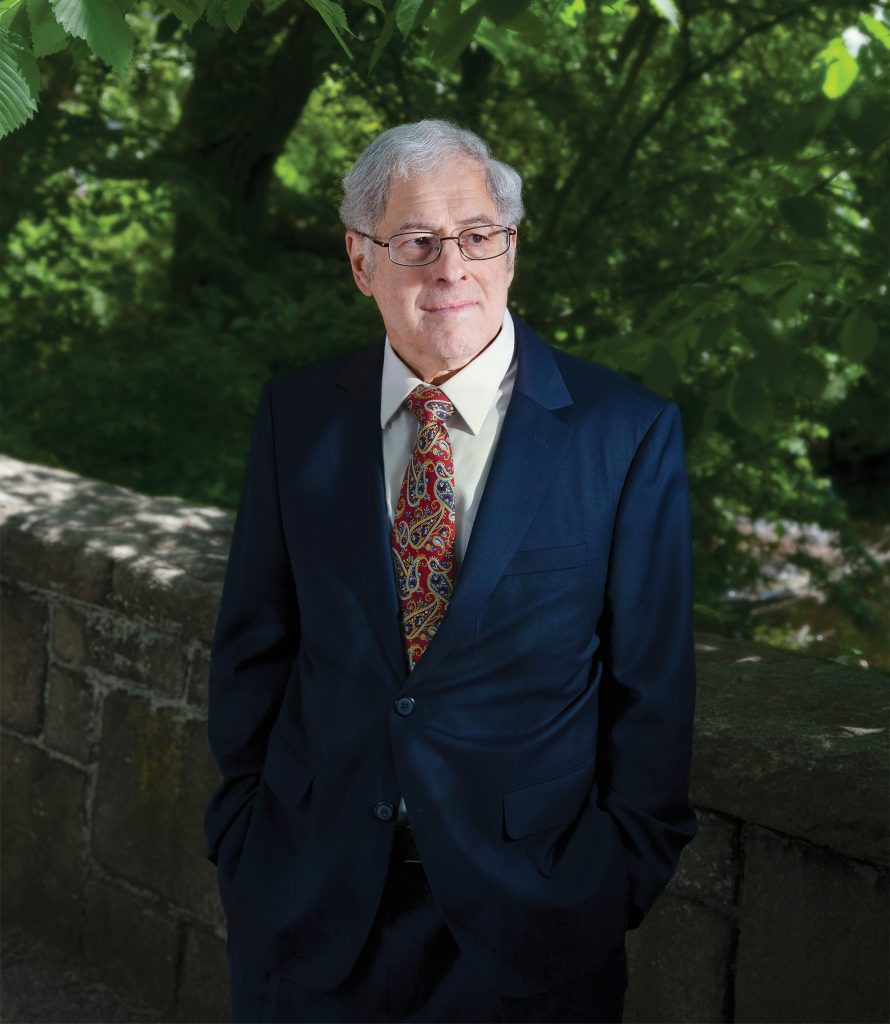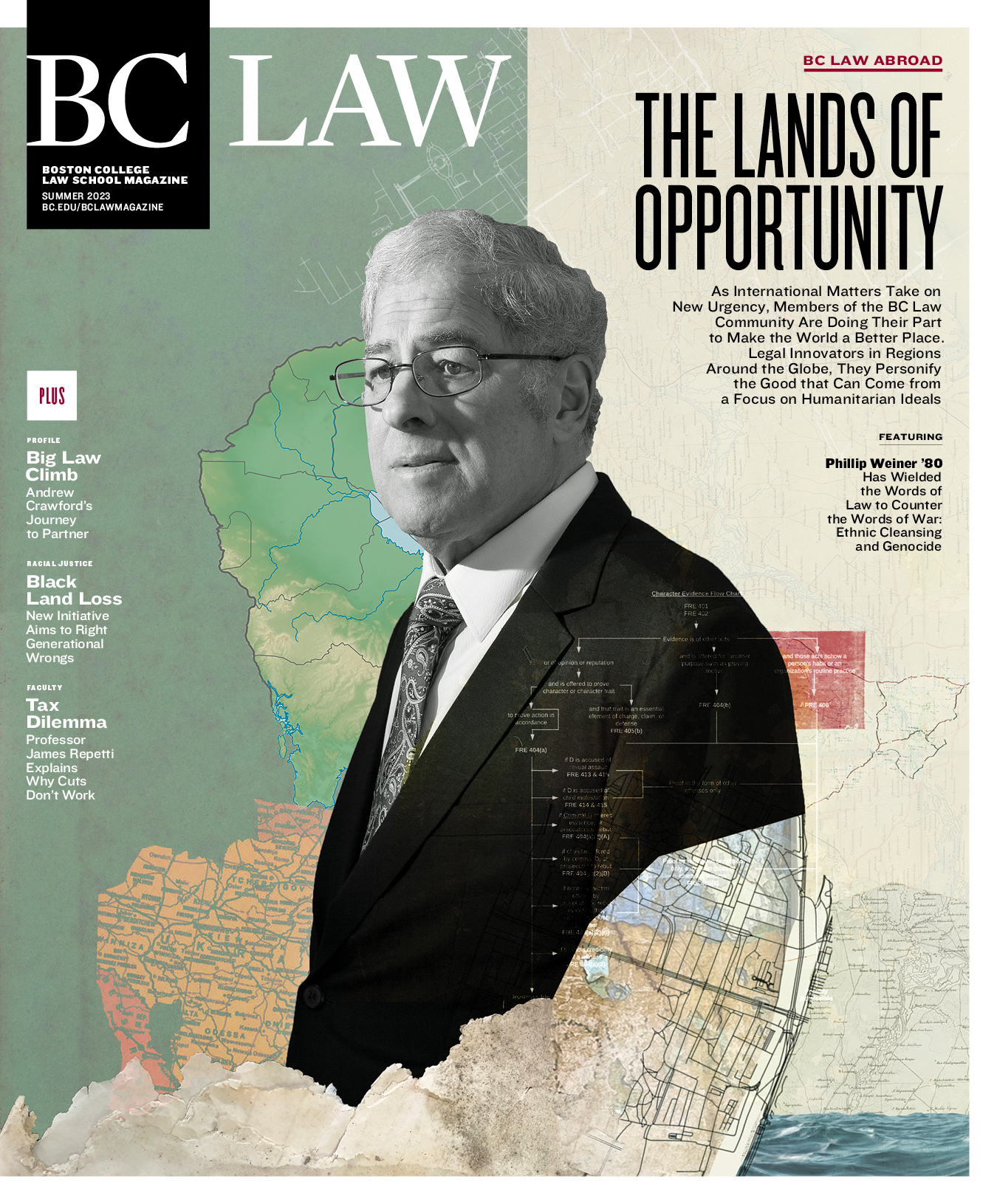His father’s toolbox held pipes, wrenches, and hacksaws—implements of a plumber. “I grew up in a lower-middle income family and the view was always, ‘You’ve got to find ways to help people,’” says Phillip L. Weiner ’80, whose father spent weekends at a summer camp on Boston’s South Shore installing bathrooms and showers in the bunks for free.
Weiner’s toolbox holds the rules of evidence, police work, and trial practice—implements of a prosecutor. He has plied his trade, sometimes as prosecutor, sometimes as judge, at The Hague, in Sarajevo, and Phnom Penh. These days, he’s an advisor to Ukraine. Wherever he goes, he finds reformers eager to turn their war-torn countries toward the principles and practices that root societies in the rule of law. He knows he can teach them. Wherever his work takes him, he makes time to do so, like his father, for free. In the process, Weiner has constructed a life dedicated to an international order founded on justice.
It started in the late 1990s, when Weiner was nearly twenty years into his career as a Massachusetts prosecutor. The American Bar Association was recruiting lawyers for short stints assisting the International Criminal Tribunal for the Former Yugoslavia (ICTY) at The Hague. Weiner applied, was accepted, completed his brief assignment, and came home.
Two years later, the ICTY offered him a job. Weiner spent 2001 to 2007 at The Hague in the Office of the Prosecutor, working to bring to justice those who had committed war crimes, “ethnic cleansing,” and genocide during the 1992-1995 Bosnian War. The atrocities carried out by Bosnian Serb troops under the command of Serbian President Slobodan Milošević had left some 100,000 people dead, two million displaced, and tens of thousands of women raped.
Not long after Weiner arrived at the tribunal, his mentor, Professor Sanford Katz, suggested that Weiner start an internship program for BC Law students. “We became the number one law school for war crimes internships in the world,” Weiner says.
Kate Devlin Joyce ’02, now Lecturer and Director of Externship Programs at Boston University School of Law, was among the first law-student interns in The Hague Program. She spent her 2L summer working on Weiner’s Rules of the Road team. The Rules of the Road was a process designed to help calm the region by preventing local law enforcement officials in Bosnia and Herzegovina from making arbitrary and illegal arrests under the guise of suspicion of war crimes. By international treaty, no arrest warrants could be issued by a Bosnia-Herzegovina court unless the case file had been reviewed and approved by Weiner’s Rules of the Road team, an office of lawyers from many countries around the world.
“You worked with a really wonderfully diverse group of people, perspectives, and life experiences,” Joyce recalls. She remembers feeling well-looked after by Weiner. “A lot of what we were reading was gruesome, horrific,” she says. “He would encourage us to go for our runs, to go for a walk along the beach.”
After coming to the attention of Ukraine President Volodymyr Zelenskyy, whose country is dealing with investigations and adjudications of Russian atrocities, Weiner has been conducting trainings with Ukrainian judges on war-crimes issues.
Franklin Schwarzer ’06, now a Boston-area real estate attorney, interned with The Hague Program as a law student and recalls the day Milošević died of a heart attack in his prison cell, forever escaping judgment in a court of law. “I remember everyone at the tribunal just being absolutely heartbroken,” Schwarzer says. He turned to Weiner to talk about it. Weiner, he recalls, said that it was important they had done the work, and now they needed to carry on. And then they went out to find a jazz club to enjoy. “There wasn’t a lot of hair-pulling or dramatics,” Schwarzer says.
After Weiner left the ICTY, he spent a semester as a visiting professor at BC Law. The Hague Program continued under the guidance of Professors David Wirth and Daniel Kanstroom, and ICTY senior war crimes prosecutor Dermot Groome ’85, a professor of law at Penn State’s Dickinson Law School. The Hague Program inspired the development of new international law programs at Boston College. Kanstroom, the co-director of BC’s Center for Human Rights and International Justice, says, “Phil was absolutely central to that.”
Beginning in 2008, Weiner spent four years as an international war crimes judge at the Court of Bosnia and Herzegovina in Sarajevo. There, through the Organization for Security and Co-operation in Europe, he co-taught seminars for judges, prosecutors, and defense lawyers. In announcing these seminars, Christopher Engels, the War Crimes Justice Project Regional Coordinator, said, “This is an opportunity for the judges, prosecutors, and defense lawyers working on crimes cases to become familiar with best practices and experiences from the International Criminal Tribunal for the Former Yugoslavia. These joint training seminars have been developed following requests received directly from the country’s justice actors. This demonstrates their willingness to work together to efficiently process war crimes cases while ensuring that the rights of the accused are respected.”
After Weiner left Sarajevo, he worked at the Extraordinary Chambers in the Courts of Cambodia (ECCC) in Phnom Penh, a UN tribunal investigating and trying the leaders of the Khmer Rouge, a brutal regime that had murdered nearly a third of Cambodia’s population in the 1970s. Weiner was chief of staff for the Investigative Judges Office from 2014 to 2019. In contrast to the ICTY, the ECCC was underfunded and understaffed. Investigations were hampered by evidence that was forty years old. Many witnesses were long dead. The ECCC was empaneled with international judges in the minority, leading some to question its impartiality.
Despite these problems, Weiner says that the ECCC’s existence helped bring Cambodia forward. Weiner himself was part of that effort. He and another tribunal judge from the United States, Martin Karopkin, volunteered to train Cambodian police, judges, and attorneys on modern principles of criminal law and procedure. Over the course of four and a half years, Weiner says that more than a thousand police officers attended their trainings, and around 20 percent of Cambodia’s judges took his classes. He helped the police set up a cybercrime unit that’s now doing successful undercover operations. In appreciation, the Cambodian police nominated Weiner for knighthood. He’s now a member of the Royal Order of Sahametrei, the highest honor bestowed upon a foreigner.
Restoring the rule of law in places shattered by genocide is challenging. “Sometimes, when you’re training internationally, if you’re teaching how to interview suspects, you’ll get questions such as, ‘Are we allowed to beat them?’ And you’ll say, ‘No, no, no, we’re not going to be beating anyone.’ And what you are doing is you’re really bringing them forward to modern police work,” Weiner says. “You’re introducing them to the rule of law and the right way of doing things.”
Weiner says the saddest question he got came when he was teaching ethics to young judges. “One got up and said, ‘I have a wife and two children. I have a mortgage. I send my children to private school. I’m going to leave my private law firm and become a judge. I want to be an honest judge. But tell me how I can be an honest judge on $400 a month?’” Weiner recalls. “When they don’t pay the prosecutors and judges even a basic salary, it invites corruption.”
When Professor Frank Garcia spent time in Cambodia engaged in law reform work, he relied on Weiner to help him navigate the country’s complex political environment. “That was important, because you didn’t want to accidentally work with elements that were wanting to keep Cambodia moving in a direction away from the rule of law,” Garcia says.
When Weiner returned to the US, he planned to launch a consulting firm, but then the pandemic came. In spring of 2021, he got word that his friend David Kamhi, a diplomat, author, Sephardic historian, and concert violinist, had died of COVID-19 in Sarajevo. Bosnia-Herzegovina was among the hardest hit regions in Europe. Less than 5 percent of the population was vaccinated. Weiner rallied a team of international judges, prosecutors, and BC Law professors. They got philanthropic support, nudged some members of Congress, and succeeded in getting the US to donate 500,000 doses of the Pfizer vaccine to Bosnia. Several other countries followed suit.
Weiner recently came to the attention of Ukraine President Volodymyr Zelenskyy, whose country is dealing with investigations and adjudications of Russian atrocities. Since 2022, Weiner has been conducting trainings with Ukrainian judges on a variety of war-crimes issues. The Ukrainian Supreme Court posted one of his lectures on its website for judges throughout the country.
Intelligent. Warm. Caring. Supportive. Generous. Welcoming. These words come up repeatedly in descriptions of Phil Weiner. Max Matthews ’08, an international humanitarian lawyer who did student internships at the ICTY and Bosnian War Crimes court, says of Weiner, “If it so happened that one team needed an extra pair of hands, he would dive in and help out and not try to control the situation, but just genuinely help as he could.”
When any law-student interns suddenly found themselves without housing, Weiner let them stay in his apartment. Many have gone on to successful careers. “I’m so proud of them,” Weiner says. “It’s like my kids.”
“My style is, we get a team, we’re all working together, period,” Weiner says. His people often toiled late nights and into the weekends. To show his appreciation, Weiner would throw Friday office pizza parties topped off with cola and cake. When he left Bosnia, everyone signed a card bidding him farewell. It read: “Remember, there will always be pizza and a slice of cake if you ever come and visit.”Pizza and cake. Perfect additions to a caring prosecutor’s toolbox.
To read other pieces about BC Law abroad, please click here.



